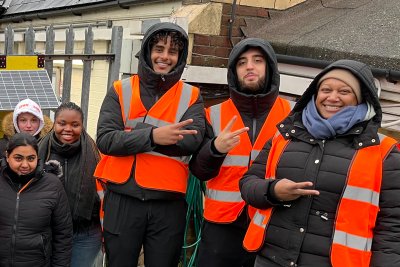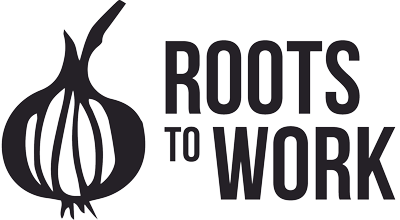
Please introduce yourself and give a brief overview of what you do.
My name is Leila Fortunato and I am the Senior Education Coordinator for Energy Garden, a Community Benefit Society that supports communities to install and maintain gardens at railway stations across London.
My role in Energy Garden is to run our Education Programme. This entails coordinating, planning and delivering classroom and horticulture KS2-5 Workshops across London Schools. I also run the Youth Training Programme for 18-24 year old Londoners, which involves me recruiting, coordinating and mentoring each cohort, co-planning pedagogy and content and co-facilitating each session.
Both my work with schools and with youth trainees includes supporting young people to learn more about renewable energy and how it works, the importance of green spaces in urban settings like London and demonstrating ways of being an active citizen through community gardening. We target schools in areas with high levels of deprivation where children often have less access to growing food and Trainees who are from minoritised backgrounds and/or low income and underrepresented in the sustainability industry.
What was your route into the sustainable food sector?
In May 2023 I joined Energy Garden which, came through my former career as a Geography and History teacher in secondary schools where I had various roles such as Head of Humanities and Head of Year. I was particularly passionate about helping young people understand the cross curricular links between climate change and development of the global south and the history of Colonialism and Imperialism. I am also passionate about supporting children from minoritised communities like my own where I witnessed disproportionate levels of inequities.
This led me to be become a volunteer Director of Banister House Solar in 2014 with the current CEO of Energy Garden, who at the time project managed what became the largest community owned solar system on social housing in the country (now London). We went live in 2015 and over the year I learned vital skills in public speaking, training young interns from the local Hackney area and gained a better understanding of solar and community work.
My work at Energy Garden involves co-creating and co-facilitating horticulture workshops in schools and sessions for Trainees that help them develop gardening skills for food growing, whilst learning about the origins and impact of our food industries.
What’s the best thing about the work you do?
The best part about the work I do is opening young people’s minds to new possibilities in the world they live in. Many believe they cannot grow food without a garden and giving them an opportunity to try growing in pots in their home and showing them the possibilities of food growing in a community garden, in the heart of a very urbanised environment, provides opportunities to address, in some small way the inequities of access to green spaces.
Our workshops provide immersive experiences like solar panel experiments in schools and trainees build and install solar panels at our gardens which again provides hands on skills and allows young people to widen the scope of future possibilities. Our work also helps to alleviate climate anxiety that many children and young people exhibit, whilst helping them to become more aware of their local communities and how they may be agents for change, both in their own lives and those around them.
Inspiring hope and empowering future generations is something I am happy to be able to do in this role whilst also having some agency in how the Education Programmes in Energy Garden take shape and grow.
What challenges or obstacles have you faced in your career and how have you overcome them?
Challenges I have faced in my career have been from working in rigid environments like large schools making it hard to support children’s individual needs. One way I overcame this was by seeking promotion which provided a little more flexibility and decision making over processes and policies. Another way was by choosing schools with an ethos more closely related to my own and by choosing smaller schools, allowing greater nurturing and support of pupils.
Pursuing voluntary work with Banister House Solar helped me to gain confidence and new skills that allowed me to seek promotion. Being around like-minded people determined to make an impact allowed me to see future possibilities and passions whilst developing more faith in my own abilities.
Learning additional teaching skills by becoming a Peer Tutor with the Recovery College during Covid, also helped me on my journey towards teaching adults. I created an online school (Black British Studies) teaching Black British History to children and organisations, which helped me to learn marketing, build websites and create social media content. This supported my journey into my current role which allows me more freedom of expression, development of content and advocacy for young people.
Who or what inspires your work in this movement?
I’m inspired to work in this field because of the inequities I witness around me both locally, nationally and globally. I’m inspired by knowing that nurturing children today with the necessary knowledge and skills regarding food growing, community work and renewable energy can produce more hopeful adults who are in a better position to make change.
I am inspired by the knowledge that it’s much harder to dream something you can’t see, so by widening the vision of our trainees we have supported their career journeys through not only employability skills and additional knowledge, but also with cultural capital, connection with others, hope and additional possibilities for a pathway into the sustainability industry.
What are your hopes for the future?
My hope is that we can expand our Education Programme to include a Programme for refugees, many of whom would love the option to grow their own food. My hope is that we increase our scope to be able to deliver more school workshops and youth training programmes which can have a positive impact on young people.
What advice would you give to anyone that is passionate about sustainable food systems and wants to work in this sector?
My advice to anyone passionate about sustainable food systems is to volunteer with local groups already engaged with this type of work and to learn as much as you can. Young people may also benefit from apprenticeships and doing short courses is also a good way to increase knowledge and make connections with like-minded people and organisations. Working in the sustainability industry in general with a different skill can also be a way into working specifically in your chosen field.
Any other thoughts you want to share?
My final advice for people would be to act now. Don’t wait until the perfect conditions to pursue what you are interest in. Take a small action today towards where you would like to be and those small actions over time will add up to something big.
Find out more more about Leila and her work at Energy Garden below.
Energy Garden- Delivering Community Energy in London
Reflections from a year of Education — Energy Garden
Introducing… Leila Fortunato, Energy Garden’s Change-making Education Lead — Energy Garden



